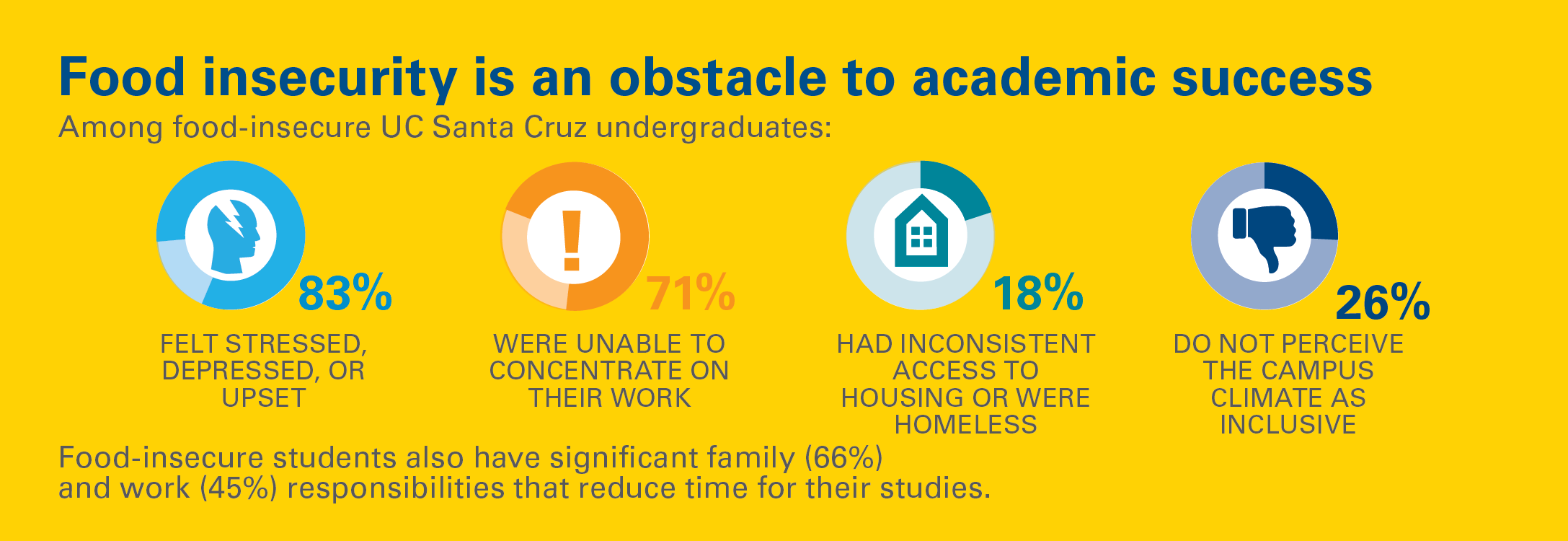
Today is Giving Tuesday! You can help UC Santa Cruz students have full minds—and bellies. Donate now
Learning is hard on an empty stomach. Focusing on a lecture is almost impossible when you’ve had to skip breakfast because you didn’t have any food. Nearly half of UC undergraduates have gone without proper access to healthy food at some point during their time on campus.
According to a 2016 systemwide University of California survey, 44 percent of undergraduate students and 26 percent of graduate students across nine UC campuses have experienced food insecurity.
UC Santa Cruz is not immune to this problem, with 48 percent of undergraduate students who completed the survey reporting that they have been without access to healthy food at some point during their student years. The campus has responded with a wide variety of measures, from emergency funds to food pantries and a “basic needs café” at Cowell College.
To complement those efforts, and do its part in raising awareness around the issue, UC Santa Cruz has launched a special edition of Giving Tuesday—the Tuesday after Thanksgiving, which has become an international day of charitable giving. Giving Tuesday will take place this year on December 3.
“This is a response to an urgent need,” said Howard Heevner, assistant vice chancellor for University Relations at UC Santa Cruz. During this day of philanthropy, alumni, parents, and campus community members will do outreach via email, social media, and networking to raise money in support of campus initiatives dedicated to student well-being.
By definition, food insecurity refers to limited or uncertain access to nutritious, safe food necessary to lead a healthy, active lifestyle. It may be temporary or long term, and can include running out of food and not having money to buy more, cutting portions and/or skipping meals, and going hungry and/or eating less than is needed.
Students experiencing food insecurity are more likely than their “food-secure” peers to increase student loans, credit-card debts, and work hours to afford their educations. It can also interfere with the ability to focus on their college assignments.
Food insecurity is a national trend on college campuses, said Brian Arao (Oakes ‘00, molecular biology), UC Santa Cruz’s associate dean of students and chief of staff. “We’re not alone,” he said. “This is everywhere.”
Arao supervises the Slug Support program, which helps students who are experiencing a crisis, often relating to their basic needs, including food security.
Such campus programs can make an enormous difference in the lives of students, said Tim Galarneau (Rachel Carson ‘05, community studies and psychology), community-engaged education coordinator at UC Santa Cruz’s Center for Agroecology & Sustainable Food Systems (CASFS), who was tasked by the campus and UC President Janet Napolitano to lead a systemwide food-insecurity initiative. He mentioned Cowell College and Dining Service’s transformative partnership with CASFS to transform Cowell Coffee Shop into an innovative nontransactional food store and café designed to address food access issues for the student population.
“The feedback we’re getting about the café has been phenomenal,” said Galarneau.
We need to increase awareness of student food insecurity so that it comes out of the shadows and is given the attention and resources it warrants, said Heather Bullock, UC Santa Cruz psychology professor and director of the campus’s Blum Center on Poverty. She co-chairs the UC Santa Cruz Food Security and Basic Needs Working Group with Galarneau.
“Something everyone can do is work to reduce the stigma associated with food insecurity,” said Bullock.
Those interested in helping to create a matching fund to fight food insecurity may contact Emily Todd at emdtodd@ucsc.edu.

